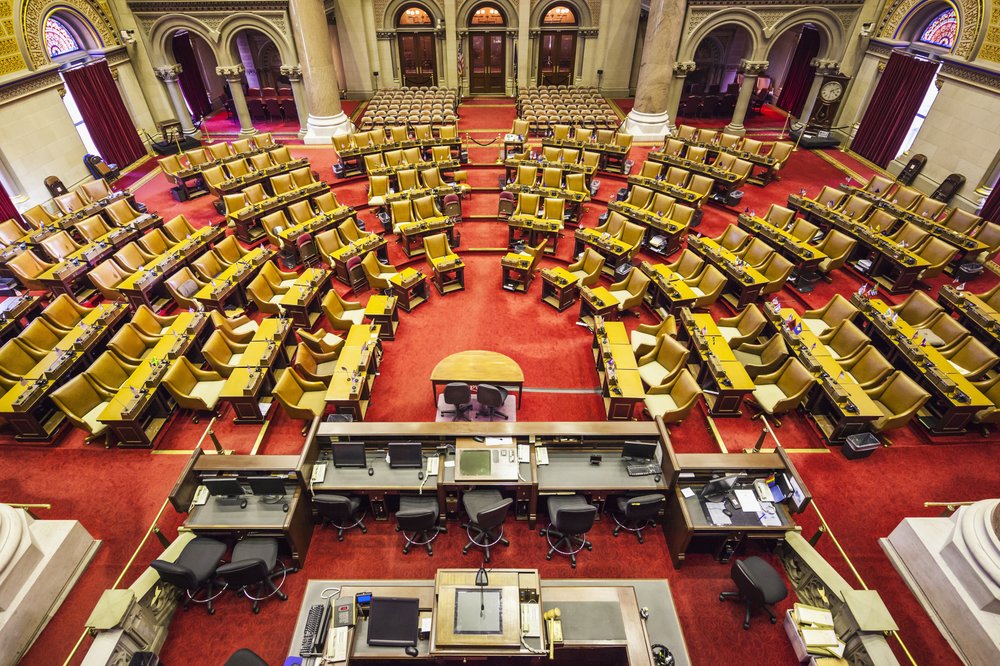New York could add abortion, contraception rights to constitution
June 30, 2022, 5:16 p.m.
State lawmakers are closing in on an agreement on a revamped Equality Amendment, but a final deal has not yet been reached.

New York lawmakers are working toward a deal to begin the process of changing the state constitution to guarantee access to abortion and contraception in the wake of last week’s U.S. Supreme Court ruling overturning Roe v. Wade.
Gov. Kathy Hochul summoned the state Legislature back to the Capitol on Thursday to take up a series of yet-to-be-printed measures that would tighten the state’s gun-control laws after the nation’s top court made it easier to legally obtain a permit to carry a firearm in public.
But legislative leaders and their staff have simultaneously been discussing a plan to revive the stalled measure known as the Equality Amendment, which – as previously written – would add a new clause to the state constitution protecting against discrimination based on a variety of traits, including sex, gender identity, pregnancy and “pregnancy outcomes.”
On Thursday morning, the closed-door discussions among lawmakers and staff turned toward further crystallizing abortion access. The talks focused on adding new language to the constitution explicitly protecting the right to abortion and contraceptive methods, according to two people familiar with the negotiations. The expanded list of discrimination protections would be added to an existing section that already protects religious freedoms in hopes of alleviating concerns from religious organizations, people with knowledge of the talks said.
State law already protects the right to an abortion up to 24 weeks from conception, or later in cases where the fetus is deemed not viable or the mother’s health is in danger. But abortion rights activists have spent months pushing for the Equality Amendment, painting it as an added layer of protection.
“Our rights are no longer safe,” Vincent Russell, president and CEO of Planned Parenthood Hudson Peconic Action Fund, said in a statement Wednesday. “That is why it is critical to pass the Equality Amendment in New York, to protect New Yorker from discrimination and to ensure access to sexual and reproductive health care are secure, regardless of who is in office.”
If approved, the amendment would be a direct response to the Supreme Court’s Dobbs decision last week, in which the court rescinded federal abortion rights and returned the issue to the states. In his written opinion, Justice Clarence Thomas suggested the reasoning could also be used to revisit a prior decision protecting contraception rights.
Even if lawmakers do pass the constitutional change, it would not take effect immediately.
To amend the state constitution, two consecutively elected sessions of the Legislature first have to approve it. Then it would be put to a referendum vote. If the current crop of lawmakers approve it before mid-August and next year’s Legislature follows suit, the amendment could be on the ballot in 2023 or 2024. If they don’t, the earliest it would be on the ballot is 2025.
As of 4:30 p.m. Thursday, lawmakers had not agreed to final language on the abortion measure, and there was no guarantee they would reach consensus. But the sponsors of the amendment – state Sen. Liz Krueger and Assemblymember Rebecca Seawright, both Manhattan Democrats – had previously sounded support for the issue to be added to the special session’s agenda.
Krueger has been excused from Thursday’s session because of a “private issue,” according to her spokesperson, Justin Flagg.
"In special session we are closer to achieving the goal of an amendment to the New York Constitution that would let the voters decide," Seawright tweeted on Thursday. "The need is ever more evident following the disastrous Supreme Court decision that abolished Roe v. Wade."
A prior version of the Equality Amendment drew concern from the state Catholic Conference and even some Democratic lawmakers for failing to include creed and religion in the classes and traits that would receive added constitutional protections.
The concerns over religious freedoms helped scuttle the amendment’s chances of passage earlier in June, when state lawmakers ended their regular session in Albany without taking it up. But Thursday’s extraordinary session revived the measure’s chances, spurring a new round of negotiations.
On Monday, Krueger introduced a new version that included a line making clear that the amendment wouldn’t “alter or diminish” the freedom of religion protections already set forth in the constitution. But the Catholic Conference wasn’t convinced, publishing a memo on Tuesday saying the updated language would “have little impact due to case law that has weakened religious liberty protections in the state over the last two decades.”
“The amendment further erodes religious freedom for thousands of health care workers and counselors whose faith traditions and professional judgments disagree with practices such as abortion services and gender transitions,” the memo reads.
Hochul has no formal role in the constitutional amendment process, but she signaled support for the Equality Amendment during an unrelated news conference Wednesday.
“I just want to get this done,” she said.
State lawmakers had gaveled in to their extraordinary session around 12:40 p.m. on Thursday, but none of the bills they’re hoping to put to a vote had yet been introduced by 4:30 p.m.
It’s likely the session could go well into the night or early morning hours, depending how long final negotiations between legislative leaders and Hochul’s office take to resolve.
This story was updated to include comment from Assemblymember Rebecca Seawright.